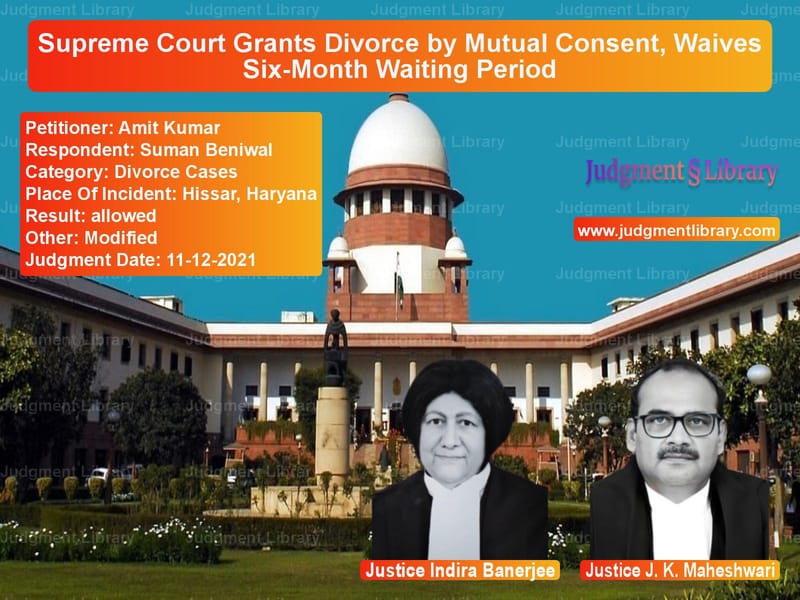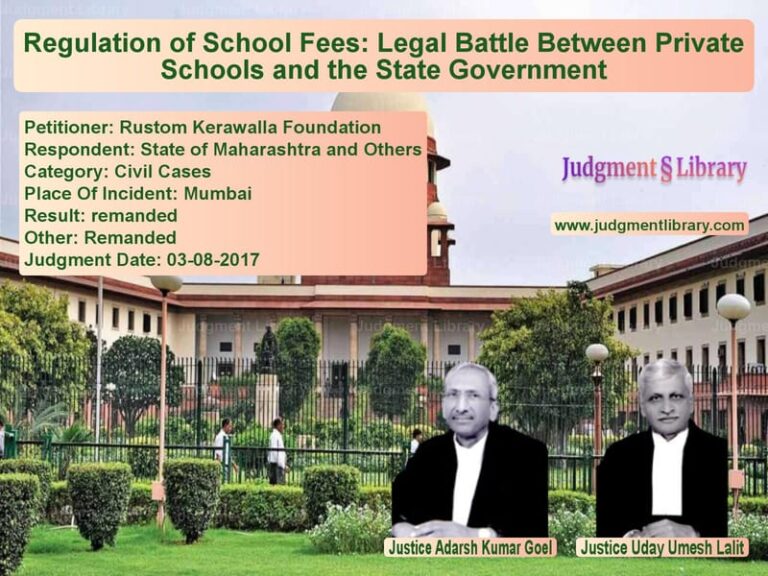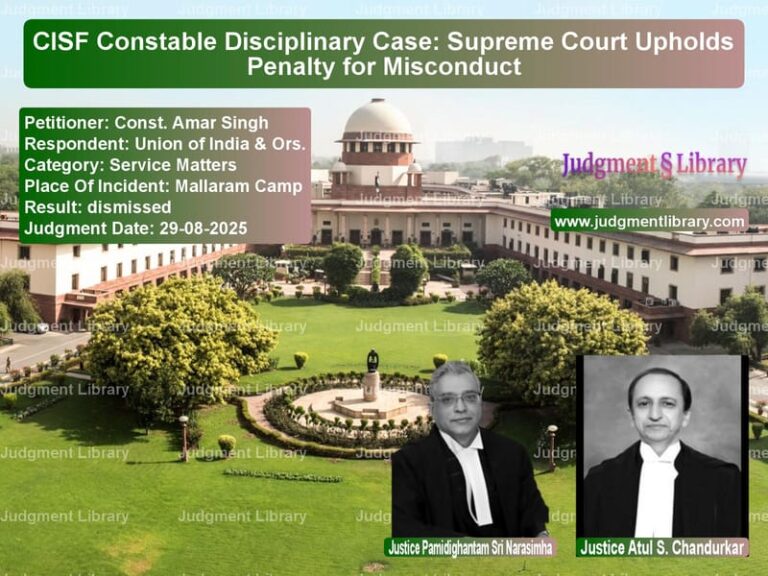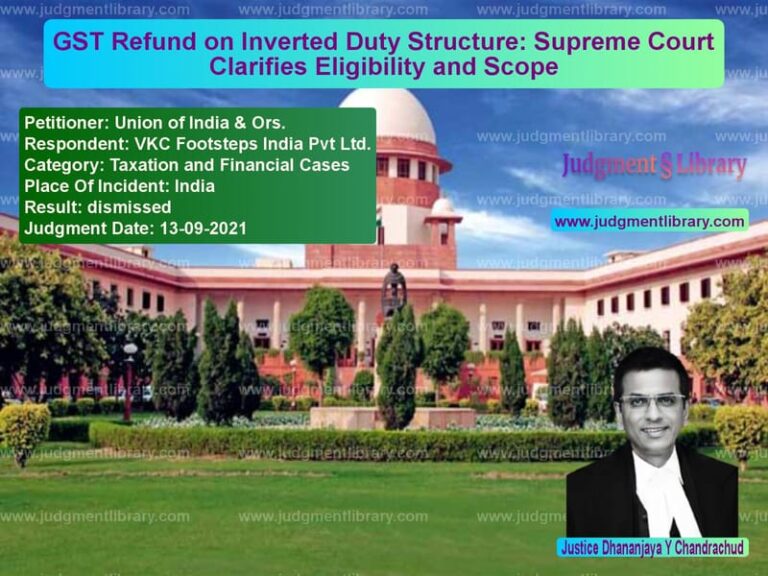Supreme Court Grants Divorce by Mutual Consent, Waives Six-Month Waiting Period
The Supreme Court of India recently ruled in favor of granting a decree of divorce by mutual consent while waiving the statutory six-month waiting period under Section 13B(2) of the Hindu Marriage Act, 1955. The case, Amit Kumar v. Suman Beniwal, involved a couple who had been separated for over a year and sought an immediate dissolution of their marriage. The Court exercised its powers under Article 142 of the Constitution to waive the waiting period, citing irreconcilable differences between the parties.
Background of the Case
Amit Kumar, an Indian Police Service (IPS) officer, and Suman Beniwal, an Indian Forest Service (IFS) officer, were married on September 10, 2020. However, their marriage lasted only three days, as they separated on September 13, 2020, due to irreconcilable differences. More than a year later, they filed a petition under Section 13B of the Hindu Marriage Act for a decree of divorce by mutual consent.
On October 12, 2021, the couple moved an application before the Family Court in Hissar, seeking a waiver of the six-month waiting period stipulated under Section 13B(2) of the Act. The Family Court dismissed their application, stating that their case did not meet the conditions for waiving the waiting period. The petitioners then approached the Punjab and Haryana High Court, which upheld the Family Court’s decision. Dissatisfied with the ruling, Amit Kumar filed a Civil Appeal before the Supreme Court.
Arguments by the Petitioner
The petitioner, Amit Kumar, made the following arguments:
- The couple had been living separately for over a year, fulfilling the primary requirement under Section 13B(1) of the Hindu Marriage Act.
- Since there was no possibility of reconciliation, forcing them to wait for another six months would only prolong their suffering.
- The six-month waiting period was directory, not mandatory, and could be waived in cases where parties had already been living separately for a long time.
- The Supreme Court, in previous cases like Amardeep Singh v. Harveen Kaur (2017), had held that the waiting period could be waived under exceptional circumstances.
Arguments by the Respondent
The respondent, Suman Beniwal, supported the petitioner’s arguments and agreed that there was no possibility of reconciliation. She contended that:
- The waiting period served no purpose in cases where the marriage had completely broken down.
- Their separation was final, and both parties had mutually agreed to the divorce.
- Delaying the process would unnecessarily prolong their agony and hinder their ability to move on with their lives.
Supreme Court’s Observations and Judgment
The Supreme Court analyzed the provisions of the Hindu Marriage Act and the circumstances of the case. The key observations made by the Court were:
- Section 13B(2) of the Hindu Marriage Act provides a six-month waiting period to prevent impulsive decisions, allowing couples time to reconsider their divorce.
- However, in cases where parties have been living separately for a significant period and there is no chance of reconciliation, the waiting period serves no useful purpose.
- The Court’s decision in Amardeep Singh v. Harveen Kaur had already established that the six-month period is not mandatory but directory, meaning it could be waived in appropriate cases.
- In the present case, the parties were separated for more than a year and had mutually agreed to end their marriage, making the waiting period unnecessary.
The Supreme Court held:
“The statutory waiting period of six months under Section 13B(2) of the Hindu Marriage Act is not mandatory but directory. If the Court is satisfied that the marriage has irretrievably broken down and there is no possibility of reconciliation, the waiting period may be waived to avoid prolonging the agony of the parties.”
Based on these findings, the Supreme Court set aside the judgments of the Punjab and Haryana High Court and the Family Court in Hissar. It exercised its powers under Article 142 of the Constitution to waive the six-month waiting period and granted the couple a decree of divorce by mutual consent.
Key Legal Precedents Considered
- Amardeep Singh v. Harveen Kaur (2017) – Held that the six-month waiting period in Section 13B(2) is not mandatory but directory and may be waived in cases where parties have been living separately for a long time.
- Devinder Singh Narula v. Meenakshi Nangia (2012) – Recognized that the Supreme Court could exercise its powers under Article 142 to grant divorce where necessary.
- Anil Kumar Jain v. Maya Jain (2009) – Established that in irretrievable breakdown cases, the Supreme Court could intervene and expedite divorce proceedings.
Implications of the Judgment
The Supreme Court’s decision in this case sets a crucial precedent for divorce cases filed under Section 13B of the Hindu Marriage Act. The ruling highlights the following key implications:
- Judicial Flexibility: Courts can exercise discretion in waiving the six-month waiting period if there is no scope for reconciliation.
- Speedy Resolution of Matrimonial Disputes: The ruling ensures that couples facing irretrievable breakdowns of marriage are not forced into unnecessary waiting periods.
- Reduction in Unnecessary Litigation: By allowing waivers in appropriate cases, the judiciary can reduce the backlog of pending matrimonial cases.
- Recognition of Individual Rights: The ruling acknowledges that individuals should not be compelled to remain in a legally binding relationship that has no future.
Final Verdict
In conclusion, the Supreme Court’s decision in Amit Kumar v. Suman Beniwal marks a significant step towards making divorce proceedings more efficient and humane. By waiving the mandatory waiting period, the Court has ensured that couples facing irreconcilable differences are not forced to endure prolonged legal battles. The judgment aligns with the evolving perspective that courts should facilitate, rather than hinder, the dissolution of marriages that have completely broken down. This ruling will serve as a guiding precedent for future cases involving mutual consent divorces under the Hindu Marriage Act.
Petitioner Name: Amit Kumar.Respondent Name: Suman Beniwal.Judgment By: Justice Indira Banerjee, Justice J. K. Maheshwari.Place Of Incident: Hissar, Haryana.Judgment Date: 11-12-2021.
Don’t miss out on the full details! Download the complete judgment in PDF format below and gain valuable insights instantly!
Download Judgment: amit-kumar-vs-suman-beniwal-supreme-court-of-india-judgment-dated-11-12-2021.pdf
Directly Download Judgment: Directly download this Judgment
See all petitions in Mutual Consent Divorce
See all petitions in Alimony and Maintenance
See all petitions in Judgment by Indira Banerjee
See all petitions in Judgment by J.K. Maheshwari
See all petitions in allowed
See all petitions in Modified
See all petitions in supreme court of India judgments December 2021
See all petitions in 2021 judgments
See all posts in Divorce Cases Category
See all allowed petitions in Divorce Cases Category
See all Dismissed petitions in Divorce Cases Category
See all partially allowed petitions in Divorce Cases Category







